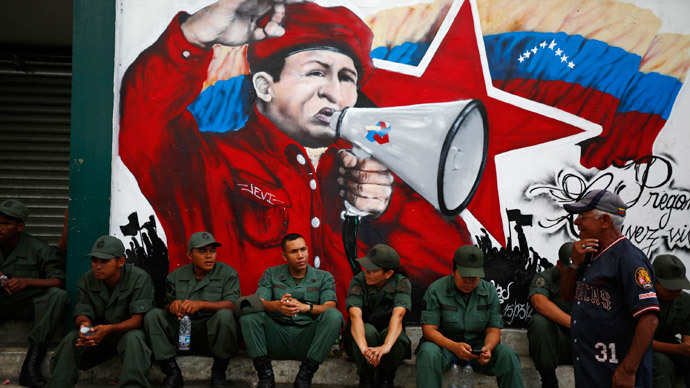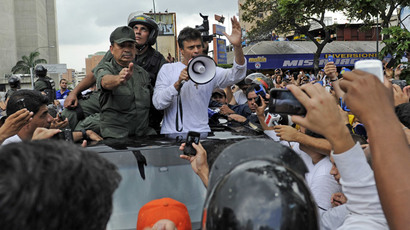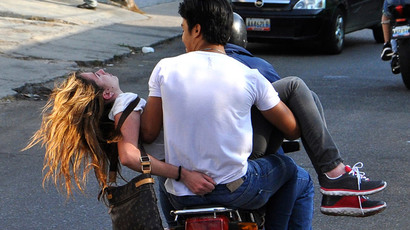Venezuela marks Chavez death anniversary amid anti-govt protests

The Venezuelan people are busy commemorating the anniversary of the death of the iconic socialist leader, Hugo Chavez, while his successor, Maduro, grapples with country-wide protests against his government.
Tens of thousands of people loyal to the late leader are due to flood the country’s streets to attend lavish events hosted by the country’s new leader and successor to Chavez and his ideas – Nicolas Maduro. A military parade honoring ‘El Comandante’ is among the festivities. Chavez’s chosen successor wants to show that despite the feeling created by the current anti-government protests gripping the country, plenty of people still exist who value Chavez’s socialist legacy of economic reform and equality for all.
Maduro, Chavez’s former Minister of Foreign Affairs, wants to make sure that the late president’s socialist legacy lives on.
Chavez’s cousin, Guillermo Frias, 60, spoke to Reuters about the late leader, saying how “enormously sad” the occasion was and that “there’s not a single day I don’t remember Hugo.”
“He changed Venezuela forever, and we cannot go back. Maduro is a poor man, like us,” he continued to speak about the new leader. “He’s handling things fine. Perhaps he just needs a stronger hand.”

The tens of thousands of Chavistas who came out to honor his memory are the poor, who Chavez helped bring out of the gutter with a series of comprehensive reforms in healthcare and education, as well as programs aimed at improving the subsistence of those at the lowest levels of income.
The late president’s greatest achievement, according to some, was to once again interest Venezuela in its own political life and future and to instill it with a belief that people and government can work together. Evidence of this can be gleaned from a steep rise in voting numbers and people taking a more active role in Venezuela’s direction.
And with good reason: Chavez’s policies caused a 50 percent reduction in poverty, with extreme cases showing a 70 percent decline. He implemented social policies that were targeted at achieving equality on an unprecedented scale in sectors like education and healthcare. Likewise, the housing and food programs were revolutionary in providing the lower classes with the means to survive. This is why Chavez was so revered and why personas like his stood historically in stark contrast to Western economic approaches, while also incurring US wrath.
Maduro has also inherited the criticism formerly directed at Chavez. The similar humble roots, the anti-US rhetoric, coupled with massive grassroots campaigns spending fortunes on slums and those living below the poverty line, also come as a package with a wave of nationalization, tough economic policies, a powerful government hand in price and currency controls – something which angers the middle classes who make up the larger part of the ongoing country-wide political rallies. And Maduro, like Chavez, has a low tolerance for political upheaval and attempts to derail his government.
There were calls for the country to be peaceful during the events marking the anniversary of Chavez’s death, but the students and the radical opposition have refused, continuing the rallies that have claimed over 50 lives in the two weeks.
The protests grew violent when students who came out en masse on Tuesday clashed with the police in the capital Caracas, prompting authorities to use tear gas to break up the crowds.
They demanded the release of political prisoners detained during the initial two weeks of protests.
Yesterday they continued to maintain barricades, while rallies were ongoing in some cities. Maduro has gone as far as calling the violence an attempted coup.

This latest wave of violence follows the arrest of opposition leader, Leopoldo Lopez, who walked into a police station to hand himself into custody about two weeks ago. The Harvard-educated opposition figure is facing charges of inciting violent protests, which carries a potential jail sentence of ten years.
Following the arrest, Maduro announced the expulsion of three US diplomats from Venezuela whom he accused of a “fascist” conspiracy to oust the socialist government.
Washington’s reaction was to give three Venezuelan diplomats 48 hours to leave the United States, while denying it had anything to do with the civil unrest.
Meanwhile, firebrand legislator Maria Corina Machado called for a march in San Cristobal in the west of the country.
RT Spanish host, Eva Golinger, however, believes that the protests aren’t achieving much politically, which makes the violence worthless.
“The anti-government protests in Venezuela have not been massive; there have been some that have been significantly large, but not larger than other opposition protests have been during the past few years. People who have been loyal to Chavismo or are part of Chavismo or supported the government now of Nicholas Maduro – I don’t think that has affected their support or loyalty. In fact I think we may have seen the contrary occur because some of the protests that have not been numerous but have been smaller-scale and more widespread throughout the country have become very violent. This has caused many people… to oppose those protests taking place in the country… as they’re not achieving any significant goals… It’s a moment when the extremists on both sides need to come together to find common ground.”














